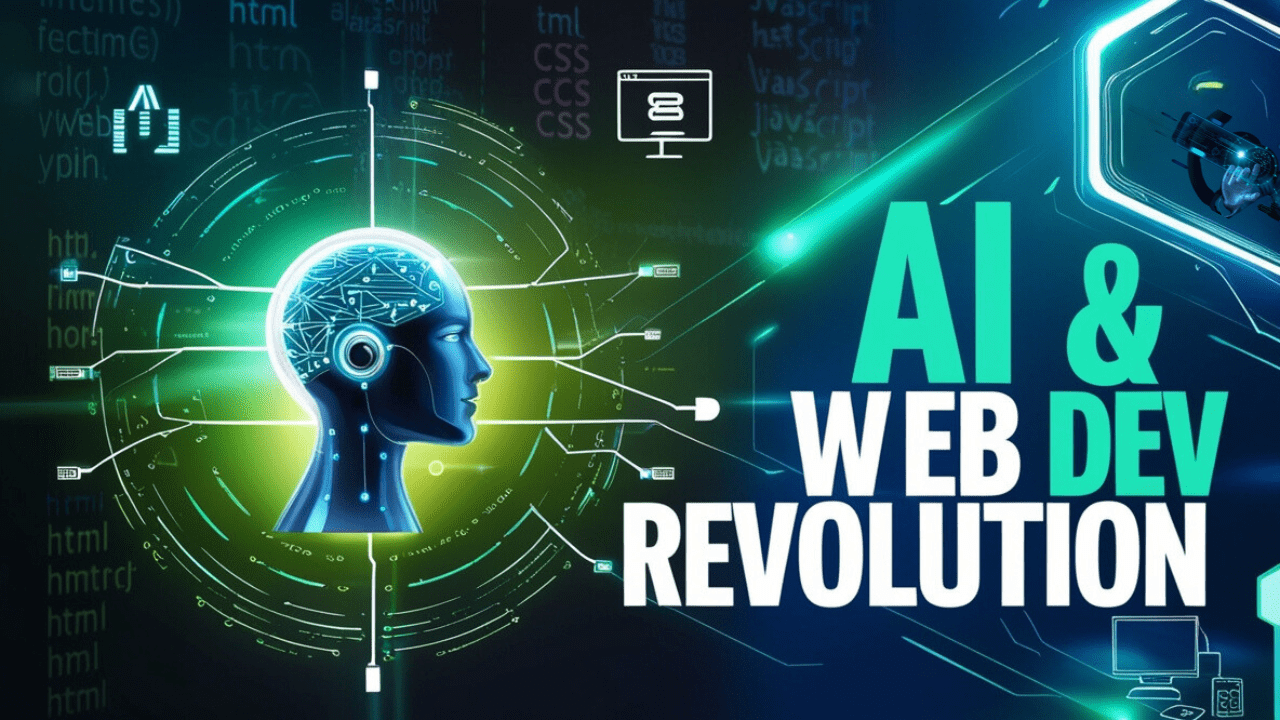How AI is Revolutionizing Web Development: A Game-Changer for the Future
In today’s rapidly evolving digital landscape, Artificial Intelligence (AI) is not just a buzzword; it’s fundamentally transforming the way websites and applications are built. Developers around the globe are witnessing remarkable advancements in AI tools and frameworks, which are not only streamlining coding processes but are also pushing the boundaries of what’s possible in web development. In this blog, we’ll explore how AI is enhancing efficiency, enabling creativity, and shaping the future of web development.
Wait if you don’t like reading—Click here to watch the video !
Why AI is Changing the Game
Imagine a world where developers can focus more on innovation rather than repetitive tasks. This is becoming a reality, thanks to AI-driven platforms like GitHub Copilot and frameworks such as TensorFlow.js. These tools predict coding patterns, suggest improvements, and even generate code snippets, significantly accelerating development cycles. The result? Faster development, reduced errors, and more robust applications that meet user demands efficiently.
This shift is crucial because businesses today are under immense pressure to deliver high-quality, functional, and user-friendly websites. AI bridges that gap by providing automation and insights that enable more personalized and efficient digital experiences.
Understanding AI in Web Development
At its core, AI involves simulating human intelligence in machines, allowing them to think, learn, and solve problems like humans. In web development, AI plays a pivotal role by automating tasks, analyzing data, and enhancing user interactions. Its impact is vast, from boosting productivity to making websites more responsive and intuitive.
One of the key ways AI enhances user experience is through personalization. By analyzing user behavior, AI algorithms can tailor content, recommendations, and even page layouts to meet individual preferences. This not only improves user satisfaction but also increases engagement and conversion rates. Imagine visiting a website that knows exactly what you need and delivers it instantly—that’s the power of AI in action.
Moreover, technologies like machine learning and natural language processing (NLP) are revolutionizing the way websites operate. Machine learning enables systems to improve over time without explicit programming, adapting to user interactions and delivering smarter, more personalized experiences. NLP, on the other hand, powers features like chatbots, allowing websites to understand and respond to user queries in real-time.
AI Tools Transforming Web Development
Several AI tools are at the forefront of this revolution. Among the most popular are TensorFlow and ChatGPT, both offering unique capabilities that streamline web development.
- TensorFlow: This open-source machine learning framework, developed by Google, is widely used to build and train AI models. In web development, TensorFlow’s algorithms can analyze data, perform predictive analytics, and enhance features like image recognition. For example, e-commerce websites use TensorFlow to recommend products based on previous purchases, improving user experience and increasing sales.
- ChatGPT: Developed by OpenAI, ChatGPT is transforming the way developers interact with code. It assists in generating code snippets, debugging, and even explaining complex programming concepts. By incorporating ChatGPT into their workflows, developers can reduce time spent on repetitive tasks and focus on creative problem-solving. One real-world example is the use of ChatGPT to create a customer support chatbot, which improved response times and enhanced user satisfaction.
AI-Enhanced Frameworks: React and Angular
Frameworks like React and Angular are also leveraging AI to enhance web development efficiency and performance.
- React: Known for its component-based architecture, React allows developers to build reusable UI components. With AI integration, React applications can analyze real-time user behavior and adapt interfaces accordingly, providing a more personalized experience. This results in higher user engagement and satisfaction.
- Angular: Angular, maintained by Google, is another powerful framework that integrates AI capabilities. Its modular design and dependency injection make it easier to implement AI-driven features like improved search functionalities through natural language processing. This enhances the user experience by delivering more intuitive, responsive applications.
Companies like Netflix and Google have already implemented these AI-powered frameworks to deliver seamless, intelligent user experiences. Netflix uses React to recommend content based on viewing habits, while Google uses Angular for intelligent data visualization tools.
Future Trends: What’s Next for AI in Web Development?
Looking ahead, AI is set to further revolutionize web development with trends like AI-driven personalization and automation.
- AI-Driven Personalization: AI will continue to enhance personalization by analyzing user data in real-time and delivering tailored experiences. Websites that not only remember your preferences but also anticipate your needs will soon become the norm. This level of customization will increase user engagement and satisfaction, driving more meaningful interactions.
- Automation: As AI technologies advance, we can expect to see more automated processes in web development, from code generation to testing and deployment. Automation will free developers from time-consuming, repetitive tasks, allowing them to focus on more strategic aspects of their projects.
As these trends evolve, staying updated on the latest advancements will be crucial for developers. By embracing these changes, developers can enhance their skill sets and remain competitive in the ever-changing tech landscape.
Conclusion
AI is not just a trend in web development—it’s a transformative force that’s reshaping the industry. From AI-driven tools like TensorFlow and ChatGPT to AI-enhanced frameworks like React and Angular, developers are now equipped with the capabilities to create more personalized, intuitive, and efficient web applications. As automation and AI-driven personalization continue to advance, the future of web development promises exciting new possibilities.
If you’re a developer looking to stay ahead of the curve, now is the time to explore and experiment with AI tools and frameworks. The future is bright for those who embrace these technologies, and staying informed will be key to your success in this fast-paced industry.
Stay tuned for more insights on AI and web development at WebAiEvolution, and don’t forget to share this article with fellow tech enthusiasts!
